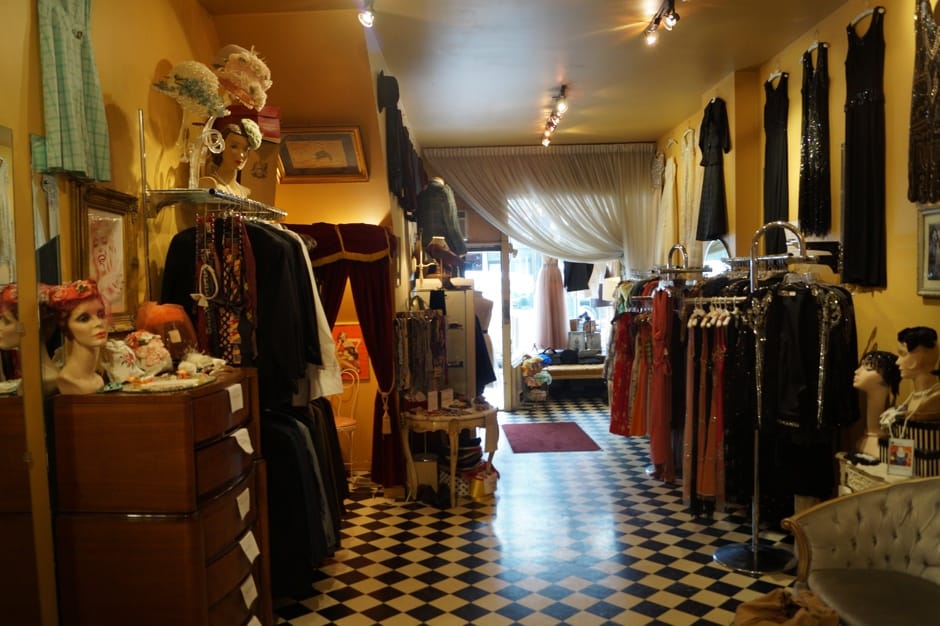As a university student living on a tiny budget in the downtown core, I proudly admit to spending the better part of my time foraging through Toronto’s array of used clothing stores, in constant search of the best bargain. In Kensington Market, Queen Street West, or at your local Salvation Army or Goodwill, the best fashion can often be found tucked away under heaps of less desirable articles — for those who are willing to make the effort.
Since the 1970s, Toronto has been home to hundreds of niche shopping areas, ranging from the eccentric spirit of Kensington to the multitudes of vintage specialty shops surrounding Queen West.
The Black Market and Cabaret Vintage on Queen Street West are some of the oldest vintage stores in Toronto, predating the major clothing brands that have since taken over Queen Street in the past decade or so. They’ve seen the city through several dramatic cultural changes, yet managed to stay relevant over their decades on the block.
Beginnings
Tracey Opperman, co-founder of Black Market, explains that the store originated out of her simple need for a summer job.
“Initially, the Black Market was just a bunch of pop-up shops,” says Opperman. “We would find an empty space, go in, offer the landlord some rent money until he rented it out or leased it out, and then various spots and incarnations of the Black Market would appear around Queen and John Street.”
Since 1980, the Black Market resides in a musky basement, dwarfed by the Shoppers Drug Mart looming over it — but that clearly hasn’t stopped people from noticing it. The “Everything $10 or Less” signs that crowd the entrance are an immediate pedestrian-stopper, along with its existing reputation as a touchstone of Toronto vintage wares that attracts curious shoppers from all over the city.
Down the street at Queen and Tecumseth, Cabaret Vintage hails from a more prestigious background.
Tao Drayton, the current owner of the store, opened Cabaret with his father in 1996. The store was his father’s fifth vintage shop in the GTA. Drayton’s aunt opened Toronto’s first vintage store in the late ’70s, entitled Mood Indigo.
Cabaret is a street-level store on two floors. Its vintage-inspired décor pays tribute to its contents, with black and white floor tiles, towering hat racks, and a Moulin Rouge aesthetic, particularly in the basement.
The prices are higher, but so is the quality, attracting the likes of celebrities such as Andre 3000, Bjork, The Killers, and Natalie Portman.
Post-punk versus lapel pins
The blaring punk-rock music that first greets you as you descend into the Black Market amply sets the tone for the type of clothing to be found inside.
The basement space is filled with t-shirts representing an infinite number of obscure post-punk bands — they’re all custom made, and are the store’s main attraction.
“The Black Market is for people who want something unique and have a love of vintage clothing,” says Opperman.
Besides its mass amount of t-shirts, the Black Market is also laden with snazzy hats, scarves, and a whole section dedicated to assorted quirky sunglasses.
What the Black Market offers for the grittier, post-punk style crowd, Cabaret provides for those wanting a dressier, statement look. The two stores have different takes on what vintage clothing means.
“What we consider to be ‘true vintage’ is clothing that emerged anytime before mass production exploded in the ’70s,” explains Drayton. “Things before that seemed to be better quality, more handmade, and more small-batch, often using natural fabrics.”
This definition is apparent in the beautiful apparel laid out across the store, ranging from colourfully embroidered suit jackets for men to flapper hats carefully arranged on the main floor’s wall.
Alternative approaches to alternative style
“At one point it was all a younger crowd looking for alternative fashion,” muses Opperman, reminiscing about the Black Market’s early days, “but now those people are bringing all their kids to shop here as well.”
Over the years, the Black Market has become known for providing its customers with quirky alternative clothing, keeping the store hip and relevant while maintaining its signature uniqueness.
For Opperman, the Black Market is able to stay interesting is because of its diversity, and, she bluntly adds, “because of the amount of stuff we have.”
Cabaret Vintage maintains a consistently positive reputation for its formal attire, providing hundreds of brides with wedding dresses, and around 200 girls a year with their prom outfits.
Choosing between the daintier treasures at Cabaret and the tough punk pieces at Black Market is similar to choosing between different periods of time. Each offers distinguishable styles of clothing that reflect different historical approaches to style. Where the two intersect is in their consumers’ shared desire to set themselves apart with alternative flourishes that you can’t find on department store racks.
“We try to cater to the people who want to distinguish their style,” said Drayton. “When somebody wants to set themselves apart with something interesting using casual clothing, they come to us.”


